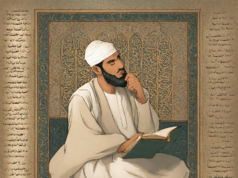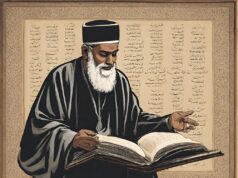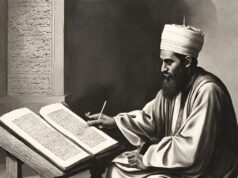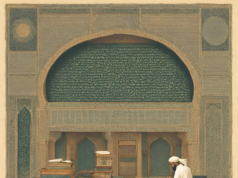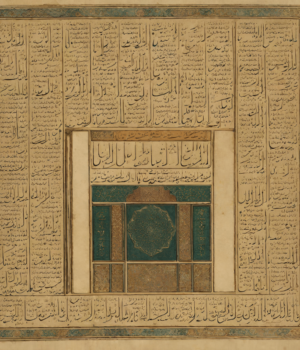
AYATULLAH SAYYID KAMĀL AL-ḤAYDARĪ ON THE RELIABILITY AND INTEGRITY OF THE IMĀMĪ ḤADĪTH CORPUS:
In this very crucial and important video (with English subtitles so all can watch, understand and benefit), the great Twelver Imāmī Shīʿa Mujtahid and Marjiʿ (scholar and high-ranking jurist), Ayatullah Sayyid Kamāl al-Ḥaydarī, a very senior professor of the Ḥawza in Iran who taught over there for over 30 years, gives listeners a crash course on the issues and problems affecting the Twelver Imāmī Ḥadīth corpus, and explains, in easy-to-understand language, and in the light of authentic narrations of the Ahlul Bayt (as), how narrations were mass-produced and fabricated, and how they ended up being inserted by the Ghulāt into the Ḥadīth notebooks of the companions of Imam al-Bāqir (as) and Imam al-Ṣādiq (as), (which are known as الأصول الأربعمائة ‘the 400 Uṣūl’), and how they were imported in huge quantities from there straight into Al-Kāfī and the other famous Shīʿa Ḥadīth compilations such as Biḥār al-Anwār (the 110 volume encyclopedia of Shia narrations), without proper and rigorous scrutiny.
Every Tradition of Ghuluww in Shi’a Hadith are Fabrications.
Sayed Kamal al-Haydari
Sayyid Kamāl al-Ḥaydarī also highlights his teacher, Ayatullah Sayyid al-Shahīd Muḥammad Bāqir al-Ṣadr’s (d. 1400 AH/1980 CE) statement, that any Ḥadīth you put your finger on in Al-Kāfī or any other Shīʿa book of Ḥadīth can likely be a fabrication, because all its narrations have been taken from the الأصول الأربعمائة ‘the 400 Uṣūl’, which is the phrase used to refer to the books of Ḥadīth which the students of the Imams (as) compiled as notes after attending the lectures of our Imams (as)). These early and original Imāmī Ḥadīth notebooks got compromised because they were poisoned and infiltrated by the accursed Ghulāt and other Ḥadīth inventors who added a lot of anti-Qur’ānic fabrications, Khurāfāt (superstitious and mythical claims), and Isrāīliyyāt (Judeo-Christian fabrications and interpolations) into them1. Special focus and energy was devoted to adding and inserting material into them which supported supernatural claims about Imams (as) which were the cornerstones of Ghālī (extremist) belief such as Imams (as) having Divine attributes, knowledge of the unseen, the power to create, and grant Rizq (sustenance), etc. etc.
Sayyid al-Ḥaydarī further makes it clear that ALL such narrations in Twelver Imāmī Shīʿa books of Ḥadīth which support Ghuluww (exaggerated beliefs and claims about Imams (as)) are manifest fabrications without a shadow of doubt as per the testimonies of the Imams of Ahlul Bayt (as) themselves.
QUESTION: But didn’t the Qudamā al-Muḥaddithīn (Classical Ḥadīth Scholars) Not Have Strong Safeguards in place to filter out False and Fabricated Aḥādīth?
Some of the Twelver Imāmī sect have tried to argue that the Twelver Imāmī Ḥadīth corpus did not suffer from the infiltration of lies and fabrications into the Ḥadīth notebooks of the companions of the 5th and 6th Imams (as), which are the foundation of the corpus, because the Qudamā al-Muḥaddithīn (Classical Ḥadīth Scholars) such as Shaykh al-Kulaynī (d. 329 AH) and Shaykh al-Ṣadūq (d. 381 AH) must have had strong safeguards in place to filter out or weed out fabricated narrations.2
Sayyid al-Ḥaydarī refutes the claim that these Muḥaddithīn tried to filter out the fabrications by pointing out that the latest Rijālī research has revealed that they actually did the OPPOSITE, i.e. they further compounded the problem and increased the number of fabrications in Shia Aḥādīth by taking from, and relying on, unknown and untrustworthy books thereby aggravating and exacerbating the problem even further.3
He then goes on to mention Biḥār al-Anwār (the 110 volume encyclopedia of Ḥadīth) by ʿAllāmah Muḥammad Bāqir al-Majlisī (d. 1110 AH/1699 CE), and points out that majority of its narrations are outright fabrications!4
Most of the Shias today are blissfully unaware of this harsh reality of highly fabricated narrations in our books of Ḥadīth due to the handiwork of the Ghulāt.
The Ayatullah in the above video also emphasises the primary and most effective solution offered by the Imams, i.e. to read the Qur’ān thoroughly, and use its guidance to separate and filter out the fabrications.
All in all, a very useful and informative video, and also a beautiful gift to those of our community members who wonder if the Imams (as) were aware of how badly the Imāmī Ḥadīth corpus had been compromised, and whether they offered any solutions to this, and the answer is a resounding ‘Yes’ indeed.
Our Imams (as) have left us objective, academic, intellectually sound, and epistemologically as well as methodologically robust solutions for filtering out inauthentic claims in their authentic teachings, at least at the level of Uṣūl (principles) which we can apply to solve problems. In the above featured video by Sayyid Kamāl al-Ḥaydarī, you will hear clear authentic statements from the Imams (as) warning their followers that fabrications and false Aḥādīth have entered the books of their companions, so do not accept any Aḥādīth attributed to the Imams (as) unless there is confirmation for their import/claim/content in the Qur’ān and established Sunnah. As usual, the learned Ayatullah brings the actual books of and Ḥadīth and Rijāl, and reads out from them aloud while ensuring the camera zooms in on the text so that the public may see for themselves that he is not misquoting or misrepresenting the source text.
For those who wish to see the main text he has quoted, we are providing it here in its original Arabic accompanied with an accurate translation so that readers may find it easier to ponder and deliberate over the content of the narration and also access the references for its authentication:
Discrediting the Imāmī Ḥadīth Corpus except what is verified by the Qur’ān and Sunnah, and why a highly skeptical attitude towards it is justified:
حَدَّثَنِي مُحَمَّدُ بْنُ قُولَوَيْهِ وَالْحُسَيْنُ بْنُ الْحَسَنِ بْنِ بُنْدَارَ الْقُمِّيُّ، قَالا حَدَّثَنَا سَعْدُ بْنُ عَبْدِ اللَّهِ، قَالَ حَدَّثَنِي مُحَمَّدُ بْنُ عِيسَى بْنِ عُبَيْدٍ، عَنْ يُونُسَ بْنِ عَبْدِ الرَّحْمَنِ، أَنَّ بَعْضَ أَصْحَابِنَا سَأَلَهُ وَأَنَا حَاضِرٌ، فَقَالَ لَهُ يَا أَبَا مُحَمَّدٍ مَا أَشَدَّكَ فِي الْحَدِيثِ وَأَكْثَرَ إِنْكَارَكَ لِمَا يَرْوِيهِ أَصْحَابُنَا ! فَمَا الَّذِي يَحْمِلُكَ عَلَى رَدِّ الْأَحَادِيثِ؟ فَقَالَ حَدَّثَنِي هِشَامُ بْنُ الْحَكَمِ أَنَّهُ سَمِعَ أَبَا عَبْدِ اللَّهِ (ع) يَقُولُ لَا تَقْبَلُوا عَلَيْنَا حَدِيثاً إِلَّا مَا وَافَقَ الْقُرْآنَ وَالسُّنَّةَ أَوْ تَجِدُونَ مَعَهُ شَاهِداً مِنْ أَحَادِيثِنَا الْمُتَقَدِّمَةِ، فَإِنَّ الْمُغِيرَةَ بْنَ سَعِيدٍ لَعَنَهُ اللَّهُ دَسَّ فِي كُتُبِ أَصْحَابِ أَبِي أَحَادِيثَ لَمْ يُحَدِّثْ بِهَا أَبِي، فَاتَّقُوا اللَّهَ وَلَا تَقْبَلُوا عَلَيْنَا مَا خَالَفَ قَوْلَ رَبِّنَا تَعَالَى وَسُنَّةَ نَبِيِّنَا (ص)، فَإِنَّا إِذَا حَدَّثْنَا قُلْنَا قَالَ اللَّهُ عَزَّ وَجَلَّ وَقَالَ رَسُولُ اللَّهِ (ص).
قَالَ يُونُسُ: وَافَيْتُ الْعِرَاقَ فَوَجَدْتُ بِهَا قِطْعَةً مِنْ أَصْحَابِ أَبِي جَعْفَرٍ (ع)، وَوَجَدْتُ أَصْحَابَ أَبِي عَبْدِ اللَّهِ (ع) مُتَوَافِرِينَ فَسَمِعْتُ مِنْهُمْ وَأَخَذْتُ كُتُبَهُمْ، فَعَرَضْتُهَا مِنْ بَعْدُ عَلَى أَبِي الْحَسَنِ الرِّضَا (ع) فَأَنْكَرَ مِنْهَا أَحَادِيثَ كَثِيرَةً أَنْ يَكُونَ مِنْ أَحَادِيثِ أَبِي عَبْدِ اللَّهِ (ع)، وَقَالَ لِي: إِنَّ أَبَا الْخَطَّابِ كَذَبَ عَلَى أَبِي عَبْدِ اللَّهِ (ع). لَعَنَ اللَّهُ أَبَا الْخَطَّابِ! وَكَذَلِكَ أَصْحَابُ أَبِي الْخَطَّابِ يَدُسُّونَ هَذِهِ الْأَحَادِيثَ إِلَى يَوْمِنَا هَذَا فِي كُتُبِ أَصْحَابِ أَبِي عَبْدِ اللَّهِ (ع)، فَلَا تَقْبَلُوا عَلَيْنَا خِلَافَ الْقُرْآنِ، فَإِنَّا إِنْ تَحَدَّثْنَا حَدَّثْنَا بِمُوَافَقَةِ الْقُرْآنِ وَمُوَافَقَةِ السُّنَّةِ. إِنَّا عَنِ اللَّهِ وَعَنْ رَسُولِهِ نُحَدِّثُ، وَلَا نَقُولُ قَالَ فُلَانٌ وَفُلَانٌ فَيَتَنَاقَضَ كَلَامُنَا. إِنَّ كَلَامَ آخِرِنَا مِثْلُ كَلَامِ أَوَّلِنَا وَكَلَامَ أَوَّلِنَا مُصَادِقٌ لِكَلَامِ آخِرِنَا، فَإِذَا أَتَاكُمْ مَنْ يُحَدِّثُكُمْ بِخِلَافِ ذَلِكَ فَرُدُّوهُ عَلَيْهِ وَقُولُوا أَنْتَ أَعْلَمُ وَمَا جِئْتَ بِهِ! فَإِنَّ مَعَ كُلِّ قَوْلٍ مِنَّا حَقِيقَةً وَعَلَيْهِ نُوراً، فَمَا لَا حَقِيقَةَ مَعَهُ وَلَا نُورَ عَلَيْهِ فَذَلِكَ مِنْ قَوْلِ الشَّيْطَانِ.
Muḥammad bin Qūlawayh and al-Ḥusayn bin al-Ḥasan bin Bundār al-Qummī narrated to us; they both said: Saʿd bin ʿAbdillāh narrated to us; he said: Muḥammad bin ʿĪsā bin ʿUbayd narrated to us, from Yūnus bin ʿAbd al-Raḥmān, that some of our companions asked him (i.e. Yūnus) in my presence: O Abā Muḥammad, why are you so strict/severe (i.e. skeptical) in matters of Ḥadīth (narrations), and why do you so frequently reject the narrations of our companions? What drives you to reject (so many of) the Aḥādīth?
He said, Hishām bin al-Ḥakam informed me that he heard Imam Jaʿfar al-Ṣādiq (as) saying: ‘Do not accept any Hadith from us unless it agrees with the Quran and the Sunnah, or you can find support for it from our prior established Aḥādīth, because al-Mughīrah bin Saʿīd (May Allah Curse him) added (fabricated) Aḥādīth to the books of the companions of my father which my father had not narrated. Therefore, fear Allah, and do not accept in our name anything that goes against the Statement of our Lord and the Sunnah of our Prophet (Saww), because whenever we narrate, we say: Allah Said, and the Messenger of Allah (SAWW) said.’
Yūnus says: I came to Iraq, and found a group of the companions of Imam al-Bāqir (as) over there, and I also found many companions of Imam al-Ṣādiq (as) over there, (and they were in good numbers), so I listened (to their narrations) from them, and took their books of Ḥadīth from them, and then after that, I presented them before Imam Abū al-Ḥasan al-Riḍā (as), so he rejected so many of those Aḥādīth, and pointed out that they were not from the Aḥādīth of Imam al-Ṣādiq (as).
Then he (i.e. Imam al-Riḍā (as)) said to me: ‘Indeed Abū al-Khaṭṭāb lied against Imam al-Ṣādiq (as). May Allah Curse Abū al-Khaṭṭāb, and also the followers of Abū al-Khaṭṭāb are continuing to add these fabricated narrations to the books of the companions of Imam al-Ṣādiq (as) to this very day.
Therefore, do not accept in our name anything that goes against the Qur’ān, because when we narrate, we always narrate Aḥādīth that are in agreement with the Qur’ān, and in agreement with the Sunnah, for we only narrate from Allah and His Messenger, and we don’t say: so and so said this and so and so said that, otherwise our speech would become self-contradictory. Indeed the speech of the last of us is the same as the speech of the first of us, and the speech of the first of us confirms the speech of the last of us. Therefore, if someone comes to you with that which goes against it, then return back his statement to him, and say: you know better what you have come with, because in every speech that comes from us, there is a Ḥaqīqah (truth), and Nūr (light/radiance) on it, and everything that does not have Ḥaqīqah (truth) with it and Nūr (light/radiance) on it is from Shaiṭān.’5
References
- Refer to the article titled: ‘How and why were the narrations from the Aimmah (as) fabricated?’ (https://al-islaah.org/how-and-why-were-the-narrations-from-the-aimmah-as-fabricated)
↩︎ - For an example of such an argument, one may refer to the article entitled: ‘Are Shia Hadiths Reliable?’ by the learned Twelver Imāmī researcher, Shaykh ʿAmmār Muslim al-Dodomī. (https://shiiticstudies.com/2019/09/24/are-shia-hadiths-reliable/#a1).
↩︎ - See: https://www.youtube.com/watch?v=2t1AdZw3avE (Time Stamp 05:01 onwards). Also a critical study of the chains of Al-Kāfī as well as other early classical Imāmī Ḥadīth compilations is sufficient to reveal how they are riddled with the names of some of the most notorious and mendacious Ghālī (extremist) Ḥadīth fabricators and inventors. Our expose on ضعفاء الكافي ‘Weak and Discredited Narrators of Al-Kāfī’ will showcase this conveniently ignored and suppressed aspect, and will leave the sincere and fair reader in no doubt about how Al-Kulaynī and other early classical Shīʿa Ḥadīth narrators took very many narrations and undeniably dubious and dodgy material from highly weak and massively discredited narrators. They also blatantly ignored the commands of the Imams (as) to rigorously verify narrations against the Qur’ān, and to summarily reject and dismiss all narrations which contradict its teachings as Ayatullah Sayyid Abū al-Faḍl Ibn al-Riḍā al-Burquʿī al-Qummī (d. 1992 CE) has very compellingly demonstrated in his thorough, scholarly, Qur’ānic, as well as Rijālī, analysis of the narrations and narrators of Al-Kāfī. See his: Naqḍ Uṣūl al-Kāfī li al-Kulaynī (Kasr al-Ṣanam). Ed. Muḥmmad Ḥusain Tarḥīnī. (Tr. ʿAbd al-Raḥīm Mullahzadeh al-Ballūshī). Markaz al-Dirāsāt al-Fikriyyah, Beirut, 1st ed., 1442 AH/2021 CE.
The conspicuous presence of narrations in Al-Kāfī promoting the most absurd and astonishingly nonsensical claims about everything from Taḥrīf (distortion) of the Qur’ān, to blatant racism and inferiority of certain non-Arab and non-Persian races and ethnicities, to unscientific myths such as the claim that the earth is ultimately resting, among other things, on the back of whale fish which is being balanced on water which itself rests on a rock that is on top of the smooth horns of a bull! to the hate-filled, sectarian claim that all non-Shīʿa are children of prostitutes and of illegitimate birth, to the claim that Sayyidah Fāṭimah (ahs) hated Imam al-Ḥusayn (as) from the moment she conceived him due to being told he would be killed, to narrations promoting superstitious claims about the genesis of different animals such as the elephant being a reincarnated adulterous king, etc. etc. etc., which we have documented in our treatise entitled فضائح الكافي وخرافاته, should be ample proof for the soundness and veracity of this observation.
↩︎ - ʿAllāmah Sayyid Jalāl al-Dīn Āshtīyānī (d. 1426 AH/2005 CE), one of the noteworthy students of ʿAllāmah Muḥammad Ḥusayn Ṭabāṭabāī (d. 1402 AH/1981 CE) and Ayatullah Sayyid Rūḥullāh al-Khumainī (d. 1409 AH/1989 CE), and a specialist in philosophy and ʿIrfān (Islamic mysticism), writes:
“بحار الأنوار مملوّ است أز أحاديث بى اساس يكي از آن موارد كه حديث واخبار مجعول زياد وجود دارد روايات وارده در مناقب است. بلكه اصل أوليه در آن اخبار عدم صحت است بواسطه كثرت أحاديث مجعوله.”
“Biḥār al-Anwār is full of baseless and fabricated narrations. One of the areas (i.e. topics) in which a very high number of fabricated narrations is found is the section of Manāqib (i.e. the chapters that deal with Faḍāil (virtues and excellences of the Prophet and Imams (as)). Rather, the primary principle and default of every narration about this topic (i.e. Faḍāil of Prophets and Imams (as)), is inauthenticity, due to the multiplicity and superabundance of fabricated narrations in this domain.”
See his: Sharḥ Muqaddimat al-Qayṣarī Bar Fuṣūṣ al-Ḥikam. Daftar-i Tablīġāt-i Islāmī, Qum, 1992 CE., p. 928. Ayatullah Sayyid Kamāl al-Ḥaidarī referred to this quotation in one of his Baḥth al-Khārij lectures. His discussion and explanation can be found in a clip titled:
الأصل في روايات فضائل الأئمة في بحار الانوار أنها موضوعة | السيد كمال الحيدري “The Default Principle in Narrations of the Faḍāil of the Imams in Biḥār al-Anwār is that they are fabricated.” It can be viewed at: https://www.youtube.com/watch?app=desktop&v=olvGpLMWuMs.
In this clip, he also clarifies that that Sayyid Āshtīyānī is actually basing this observation of his on the research-based insights of his teacher, Grand Ayatullah Sayyid Ḥossein al-Burūjerdī (d. 1380 AH/1961 CE).
The transcript of the lecture which contains Sayyid Kamāl al-Ḥaydarī’s discussion about this can be found on official website under the heading : من أهم اسباب عدم الثقة بالموروث الروائي (1) “One of the Most Important Reasons for lack of confidence in the Shīʿa Ḥadīth Corpus (Part 1)”, see: http://alhaydari.com/ar/2016/12/58950/.
↩︎ - al-Ṭūsī, Shaykh Abū Jaʿfar Muḥammad bin al-Ḥasan. Ikhtiyār Maʿrifat al-Rijāl (Known as Rijāl al-Kashshī). Ed. Jawād al-Qayyūmī al-Iṣfahānī. Muʾassasat al-Nashr al-Islāmī al-Tābiʿah li Jamāʿat al-Mudarrisīn bi Qum al-Musharrafah, Qum, 1st ed., 1427 AH., pp. 194-195. [Narration # 401/3]. In the edition available online edited by ʿAllāmah Ḥasan al-Musṭafawī, and published by Muʾasseseh Nashr Daneshgah-e Mashhad, Mashhad, 1st ed., 1409 AH., see: vol. 1, pp. 224-225. (https://lib.eshia.ir/10241/1/224 – https://lib.eshia.ir/10241/1/225).
Authentication: This narration has been authenticated by numerous high profile Marājiʿ in their advanced level Baḥth al-Khārij discourses on ʿIlm al-Uṣūl. These include, but are not limited to:
– Ayatullah Sayyid Abū al-Qāsim Al-Khū’ī (d. 1413 AH/1992 CE). See his: Muʿjam Rijāl al-Ḥadīth wa Tafṣīl Ṭabaqāt al-Ruwāt. Muʾassasat Al-Khū’ī al-Islāmīyyah, Najaf, n.d., vol. 15, p. 268. (https://lib.eshia.ir/14036/15/268).
– Ayatullah Sayyid ʿAlī al-Ḥusainī al-Sīstānī. See: al-Hāshimī, Sayyid Hāshim. Taqrīrāt fī ʿIlm al-Uṣūl – Taʿāruḍ al-Adillah wa Ikhtilāf al-Ḥadīth – Taqrīran li Abḥāth Āyatillāh al-Sayyid ʿAlī al-Ḥusainī al-Sīstānī (Transcripts of Baḥth al-Khārij Lectures). Ismāʿīlīyān, Qum, 1st ed., 1441 AH., vol. 1, pp. 433-434.
– Ayatullah Sayyid Muḥammad Saʿīd al-Ṭabāṭabāʾī al-Ḥakīm. See his: Al-Muḥkam fī Uṣūl al-Fiqh. Muʾassasat al-Manār, Qum, 1st ed., 1414 AH/1994 CE., vol. 3, p. 213. (https://lib.eshia.ir/13012/3/213). ↩︎

